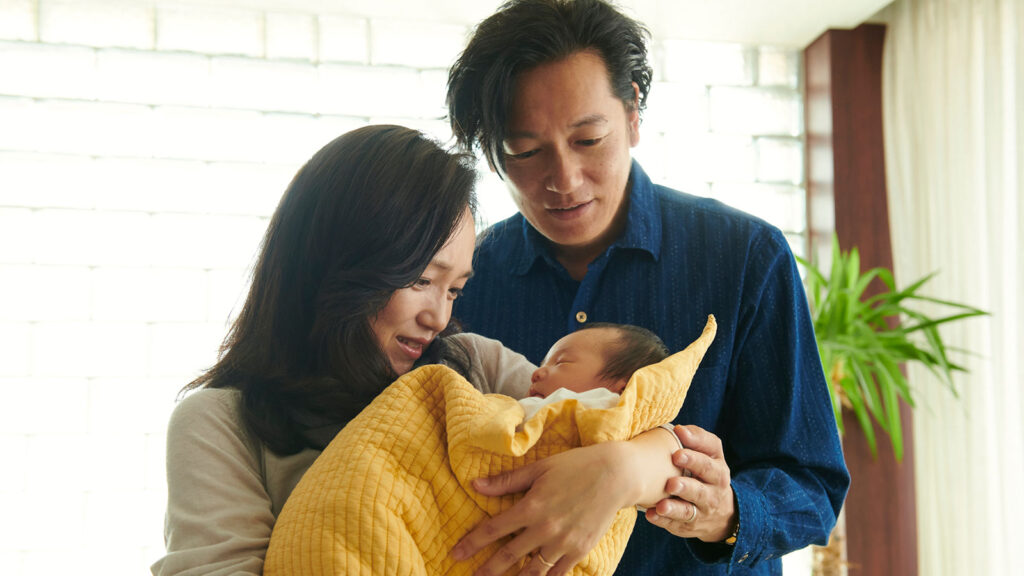A middle class husband and wife, Kiyokazu (Arata Iura) and Hikari (Aju Makita), find themselves incapable of conceiving. Rather than give up, they enlist an adoption service called Baby Baton. The company—whose slogan is “Pass the baton. Give babies a future”—connects mothers financially unable to care for their children with stable guardians. Kiyokazu and Hikari craft a happy life with their adorable son Asato (Reo Sato), but when his biological mother Hikari (Aju Makita) appears on their doorstep demanding him back, their life is thrown into disarray. Naomi Kawase’s “True Mothers” tries to interweave two powerful themes—teen pregnancy and the longing for family—but ultimately emotionally falters due to its sprawling timeline.
“True Mothers” takes a three-pronged approach. It opens with the adoptive parents in the present day, then flashes back to their decision to adopt, and then recounts the biological mother’s journey to give up her child—all with the tryptic ultimately intertwining. With its placid pacing and meticulous plotting, “True Mothers” could easily play as a miniseries. But as a narrative film, the story is the slowest of slow burns. Rather than larger revelations, the events find their oomph through sun-drenched photography and tranquil shots of nature: cherry blossom trees, the sea, and birds. But those visual elements provide anesthetic to a pain that never felt alive.
It’s not accurate to say that Kawase’s “True Mothers” traverses uneventfully. Certainly the emotional toll of an older couple struggling to conceive plays powerfully—one need only to consider Tamara Jenkins’ conception dramedy “Private Life”—but the biological mother’s melodramatic past informs too much of everyone’s relevant present. The winding path causes the final scenes not to play deeply, as they should, but numbingly. Thoughtful performances from a strong cast, Makita’s especially, aren’t enough to float a story that too often sinks in its own misery.

Ben Sharrock’s dark comedy “Limbo” plays a much lighter note. Omar (Amir El-Masry), a Syrian refugee seeking asylum in Scotland, lives on a cold marshy isle among other migrants, who are similarly waiting for approval. In fact, ever since he arrived, with a cast on his arm, he’s not been able to play his oud. Though he sometimes tunes the strings, the notes always sound alien to him, even while his father’s oft-repeated phrase, “A musician who does not play his instrument is dead” rings inside of him all too familiarly.
Spiritually, Omar is dead. A hollowness pervades him whenever he pines for a portion of his culture. For instance, the local supermarket only has salt and pepper, but not the sumac needed to make his mom’s special recipe. The landscape’s rolling marshes and the sharp cold winds metaphorically tear not just his heart apart, but the other migrants too. For instance, his friend, the endearing Fahard (Vikash Bhai) has waited over 32 months for a decision on his case. Tired of the loneliness, he robs a rooster and names it Freddie Mercury. Conversely, brothers Abedi (Kwabena Ansah) and Wasef (Ola Orebiyi) watch their relationship fray into tragedy as they grapple with the unlikelihood of their immigrant dreams coming true.
From day-to-day, they attend cultural awareness classes taught by the dimwitted tandem of Helga (Sidse Babett Knudsen) and Boris (Kenneth Collard). The pair, like much of the island’s inhabitants, are culturally unaware of their students’ intelligence and humanity. For instance, in one hilarious scene, the students are taught to make transitional phrases prefaced by “I used to.” The exercise is meant to help them move on from their past, yet some of the examples given by Boris include, “I used to ride my elephant to work,” and “I used to have a home until coalition forces blew it up.” Meanwhile, xenophobic rumors of Syrians as terrorists and rapists fill the local residents with fear. In these instances, Sharrock’s screenplay plays upon melancholic humor for sharp laughs, while El-Masry’s deadpan deliveries buoy the comedy’s tone with equal ease.
But even with the flippant microaggressions, at its heart, “Limbo” is a mournful film. Omar spends most days lugging the cumbersome case containing his oud down deserted roads to the island’s lone phone booth. There he contacts his mother and father, now living in Istanbul, and wonders aloud if he made the right decision to leave, while his estranged brother Nabil stayed to fight. His refugee conundrum, which in this case doubles as survivor’s guilt, causes Omar to question whether he escaped or whether he abandoned his country. It’s a speculation that absolutely haunts him and speaks to the real sense of loss felt by migrants.
Karel Dolak and Lucia Zuzchetti’s editing patiently holds its gaze on sight gags and glimpses of tragedy in equal measure. And Sharrock’s “Limbo” has plenty of both. While the film slows in its second half, weighed down by representing Omar’s cultural loss in esoteric fashion, “Limbo” remains hilariously sad, and a love note to the displaced.

Not since their sinister thriller “The Hunt,” released in 2012, have long-term collaborators director Thomas Vinterberg and Mads Mikkelsen worked together. In their latest film, the latter returns in the role of a teacher. But rather than play a man falsely accused of sexually abusing his kindergarten student (as in “The Hunt”), he’s the despondent high school history teacher Martin. Once a man of vitality, Martin drudges through his life, marriage, and job with such lackluster intent that all three are near-collapse. But when he and his three fellow teachers begin drinking during class, he rediscovers an energetic part of himself he buried long. Vinterberg’s Danish-language tragicomedy “Another Round” (or “Druk”) isn’t as compelling as “The Hunt,” but its weighty theme of alcoholism, and its story of a crippling mid-life crisis, engages all the same.
Martin’s troubles begin when he attends a birthday dinner hosted by his best friend and colleague Nikolaj (Magnus Millang). A philosophy teacher, Nikolaj tells his fellow guests—soccer coach Tommy (Thomas Bo Larsen) and music instructor Peter (Lars Ranthe)—about psychiatrist Finn Skårderud’s philosophy that human bodies naturally do not produce enough daily alcohol, so we must consume .05% to be healthy. To test the theory, the quartet begin day drinking in class. Martin, who studied jazz ballet 12 years ago and had a research position and PhD lined up, experiences the greatest change. He evolves from merely reading to his students from the history book to spontaneous lessons that resonate with his students. The same goes for Tommy, who instills confidence in his young soccer player derisively referred to as specs by his teammates.
Martin’s moribund marriage with Amalie (Helene Reingaard Neumann) also gets a shot in the arm. Mikkelsen delivers a physically visceral performance, as Martin first appears haggard and downtrodden, then later grooves loosely in his intoxication, and finally looks worse than how he began. His appearance alters mostly because the quartet’s boundaries change. Initially, they decided to follow Hemingway’s model: Drink only before 8pm and never during the weekends. Considering his prodigious writing talent, they think he’s the go-to. Never mind that Hemingway committed suicide by 61. But as they push the limits, and their wild antics transition from their wildly funny ribbing of each into grave danger, the disastrous consequences of their experiment become inevitable.
Not many directors can pull off what Vinterberg does here, and with any other creator the conceit would probably devolve into an absurdly daft Adam Sandler comedy. But “Another Round” not only has Mikkelsen, whose stoic presence grounds even the most ludicrous stunts, but also a tone that doesn’t seek to lampoon these men. Instead, Lindholm and Vinterberg’s screenplay imbues heaps of pathos onto teachers who can’t help but wonder where their youth went. By the final catharsis, Mikkelsen’s enrapturing dance on the docks of the river, we’re not only overtaken by the intoxicating jubilation of feeling alive, but we’re reminded of why he and Vinterberg make such a formidable duo.












